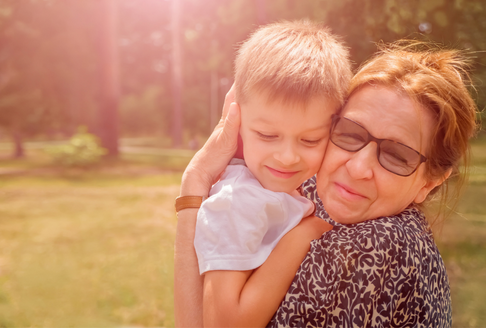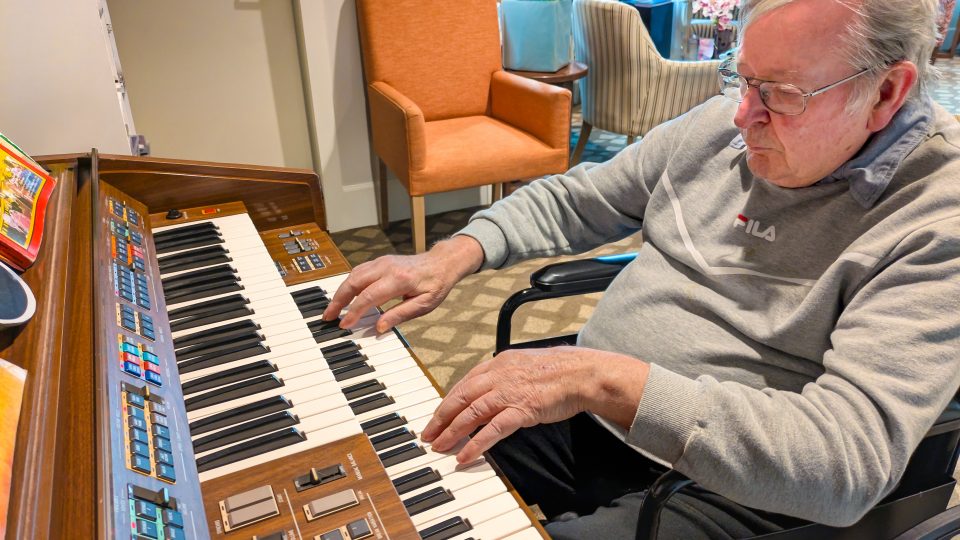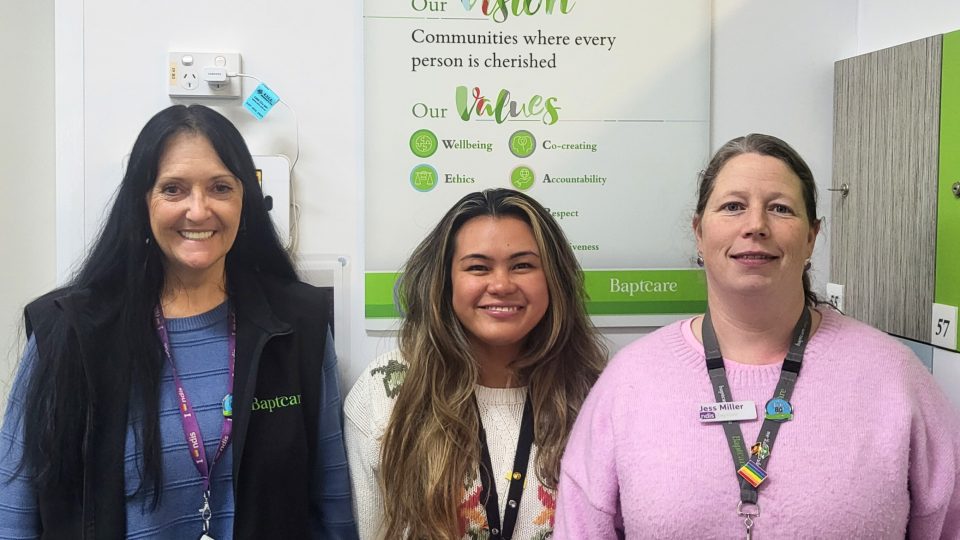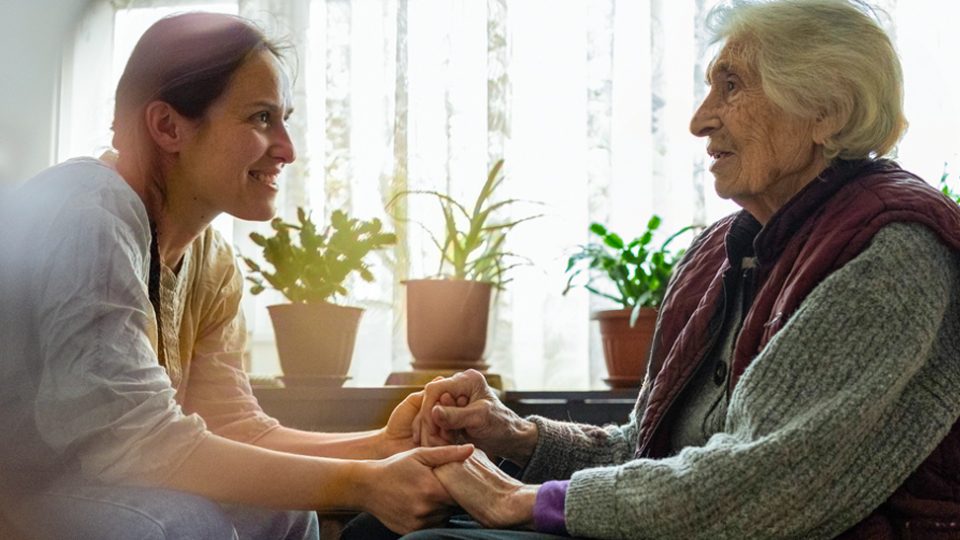National Carers Week 16-22 October | Meet Jenny*, Baptcare Kinship Carer - Kinship caring in Jenny's words
- 17 Oct 2022

Jenny and Richard* are part of Baptcare’s wonderful kinship caring community. Becoming kinship carers for their grandson has not been an easy journey, but it has been made smoother with the help of Baptcare and their personal case worker. Jenny’s story highlights the complications and exhaustion often involved in being a carer but also the deep gifts experienced by carers who are able to help loved ones’ experience fullness of life.
Please tell us about how you became a kinship carer
Becoming a grandparent is a very happy event. It is the beginning of a whole new chapter in one’s life. It is also easy, compared to becoming a parent for the first time.
Of course you worry about your daughter, her partner of some years and their unborn child, and hope they will all be well. And to hold that healthy, newborn baby boy in your arms for the very first time is an unforgettable moment of absolute, undiluted joy and love and gratitude. You know that your daughter is a wonderful, loving mother, believe that she will get help and support from the father, that they will know how to raise their child in this modern world, and that your role as grandparents would be to love and support them, but mostly, to enjoy the times of this new family togetherness…
One month later, father had left home and abandoned mother and child without a word of explanation. Our daughter was literally heartbroken. A few months later she suffered a cardiac arrest and respiratory failure and never woke up from her coma.
Our 5 month old grandson now only had nan and pop.
Fast forward seven years to the present day…
It is not easy to be Nan and Pop and raise a grandchild. For us, there came a point when we realised that our love for our grandson was not enough and that we needed help. Pop’s health, which had already been poor, was further on the decline, and after Nan did not fully recover after a coma and lengthy stay in hospital, Pop had to take on even more of the responsibilities.
Our farm, remote and beautiful, is a great place to live and grow up at. At the same time, it makes it increasingly more difficult to help our grandson to develop, get to school, etc.
So Pop registered with My Aged Care.
He received reams of glossy, fancy brochures about all the agencies and services an aged person was entitled to.
We had countless phone conversations with professional listeners of all those agencies in faraway call centres, who read questions off their pre-set scripts so they could tick off the answers.
Unfortunately, we didn’t fit their scripts, and, one by one they told us that our case “did NOT fit within their mandate”.
We decided to make one last call.
We rang Baptcare, who run a program called grandparents raising grandchildren. It was a local phone number, not some remote call centre.
It was the best thing we’ve ever done.
Baptcare actually listened to our story, and, from the beginning, cared. No pre-set questionnaires, glossy brochures, false promises.
Our support worker, Allan, took on our case and came to visit us on the farm. With his help, we finally made progress, and still do. Hardly a week passes without communication, or a visit from him, and we feel very lucky and grateful to have his and Baptcare’s support.
Our grandson still remembers the first Baptcare Christmas party and barbecue, where he got to play with other children raised by grandparents, and even got a remote-control car from Santa. And Pop got to talk to grandparents in similar circumstances.
Since Allan started helping us and facilitating our dealing with many of the above mentioned agencies, our lives have improved considerably.
He also spoke on our behalf with the principal of our grandson’s school, and other people in the DoE (Department of Education) as we could not get our grandson to school every day anymore, and the DoE would not acknowledge our difficulties. With his help, our grandson got enrolled at e-school as well and was provided with a computer for the days Pop cannot drive him to and from school.
We were also generously provided financial assistance by Baptcare in getting clothes etcetera for our grandson.
Allan also sped up the process of getting two hours a week of domestic assistance. He spoke on Pop’s behalf to Carer Gateway and got him a grant of $3000 for Norwich Farms to provide and deliver meals for us.
He is still doing his utmost in trying to help with school transport. And to help us find a way of ascertaining that our grandson’s lawful guardianship will be passed on to our son and his partner once we won’t be able to fulfil our role anymore.
Meanwhile we can look forward to the term holidays, when, thanks to Baptcare, our grandson gets to go bowling.
And after I had told Allan some time ago that our grandson likes to play basketball he straightaway looked into getting him a hoop to play and practice at home.
Most of all, Allan cares. He listens to our problems, and always gives us hope. He always reassures us that we won’t give up.
We want to thank Allan and Baptcare for everything they have done for us.
Can you describe how you find being a kinship carer?
Looking back, I really don’t know how we coped. Both with the indescribable pain of grief and loss, and the need to keep this precious, helpless little grandson of ours healthy and safe, and giving him all the love and attention he so fully deserves.
I guess you could say we were thrown in at the deep end of kinship caring…
But there is, and was, never any doubt in our minds that taking on raising our grandson was the most important and the only right and possible decision we could make.
It was, and still is, a huge challenge to fulfil our roles as kinship carers. Our age (mid-sixties and mid-seventies) and decreasing health have become major issues.
To see our grandson grow and develop into a fine and happy child is a great gift and pleasure, and I’m sure it keeps us going, giving all of our lives purpose and direction.
How is it different to a mothering/parenting role?
Our children were born in the eighties. We were lucky enough to raise them in the country. We felt very much part of society and had the sense of contributing and shaping the dynamic of our community. Values and rules were clearly defined and recognised. Back then we were strong and healthy and could enjoy many physical activities together. Parenting wasn’t easy – finding the right balance between the needs and wants of children, and still retaining a sense of one’s own individuality, at the same time growing as a couple, as well as earning a living presented many challenges.
Now, being grandparents raising a child, the dynamic feels quite different. We are a solid team and can devote all our time and energy to kinship caring.
Which is just as well, as life has become so much more complex, and the belief and value systems of society have changed. It is not our world anymore.
Old people are marginalised, and we don’t want our grandson to become marginalised by proxy.
Do you attend any Kinship/carer groups with other carers?
My husband had, and still has, through Baptcare, the opportunity to talk with carers in similar circumstances. As the Baptcare group meets in town, and transport has become one of our major problems, he cannot get to every meeting, but we can still keep in touch with other carers.
To have the Baptcare group and to exchange experiences has made a great difference to our lives. It is reassuring to learn we are not the only kinship carers finding it hard to manage certain aspects of our caring roles. We can also give and receive advice, and we feel like part of a community.
Can you share your experience of working with Baptcare?
Our lives have changed for the better since the first time I phoned Baptcare.
It was a local number, not a faraway call centre. There was a real person answering my call and actually listening to our problems.
There was no delay between my first call and Allan Barton coming to see us for the first time.
Not once did Baptcare tell us that our circumstances “regretfully do not fit within their mandate “, a standard phrase we have heard all too often.
We feel valued, not marginalised, and we know that whatever issues and problems we encounter as kinship carers, we can turn to Baptcare for help and advice.
What is one of the most challenging aspects of being a kinship carer?
To love and care for our grandson without him being perceived and treated as disadvantaged because of being raised by old people.
What would you say to people questioning whether to be kinship carers?
It is a very personal choice that no one can make for you.
It will be life-changing, that’s for sure.
If you make that choice, you do not need to feel alone and helpless at times. There are others like you.
Baptcare can help you find this community as well as all the help and support you may need.
Any last words on Baptcare?
Life is truly a journey. Until we found Baptcare there have been times over the last seven years when we felt totally at a loss, abandoned by the society we live in, and wondering why none of the organisations old people are invited to register with in order to access support, have neither interest in, nor time and resources for grandparents raising grandchildren.
Baptcare acknowledges the worth of kinship carers and helps them through the rough times.
We are so glad Baptcare exists and recognises that it is not always an easy road to be a grandparent bringing up a child in this day and age. Like no other organisation or community, they make you feel like a worthy human being.
*Real names changed for privacy reasons
Community news
-

Wyndham Lodge Choir
Every Tuesday afternoon, residents gather in the sunny music room at Baptcare’s Wyndham Lodge Residential Aged Care community to sing together.
- 25 Jun 2025
-

The Green Team at Moonah Hub
The Sustainability Team, known as ‘The Green Team’, are based at Baptcare Moonah Hub in Hobart and are all about promoting environmentally friendly and sustainable practices in their office, the wider organisation and the local community. We asked Jess Miller, their enthusiastic and determined leader, all about the team and what they do. Read more below!
- 11 Jun 2025
-

Tips for addressing depression in older adults
Our post-retirement ‘golden years’ are often portrayed as a time of relaxation and enjoyment with plenty of time on our hands to enjoy the things we love. However, for many older adults this period can be overshadowed by struggles with depression.
- 05 Jun 2025
